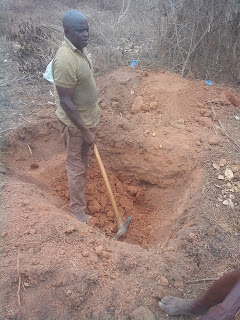NIGERIA LAUNCHES FIRST STAPLE CROP PROCESSING ZONE
NIGERIA LAUNCHES FIRST STAPLE CROP PROCESSING ZONE
Wed, Jan 15, 2014
The Federal Ministry of Agriculture and Rural Development (FMARD) has launched the first phase of its Staple Crop Processing Zones. The SCPZ is a bold and visionary investment initiative of the Federal Government to drive the modernization of agriculture and fill the missing link between agriculture and industrialization. It includes the construction, development, and operation of agro-processing clusters in areas of high-food production across Nigeria.
At a three-day presentation of technical Reports, stake-holder engagement, and a formal launch of the Kogi State SCPZ in Alape in the Kabba-Bunu LGA, the Minister of Agriculture and Rural Development, Dr. Akinwumi Adesina said “the SCPZs have the full backing of the Federal Government and hold the solution to Nigeria’s socio-economic problems by bringing best in class agro-industrial concepts that will benefit millions of Nigerians in the first six Staple Crop Processing Zone modelsin Kogi, Lagos, Kano, Niger, Anambra/Enugu and Rivers.” While noting that a lack of modern processing capacity has robbed Nigeria of it’s potential to create sustainable agriculture, Dr. Adesina has described SCPZ’s as “a game changer.”
According to Governor Idris Wada, “Kogi State has already invested heavily in the development of the Alape, Kogi State SCPZ. We look forward to working closely with potential investors, the Federal Government, and host communities to make the SCPZ the economic and financial success we know that it will be.”
Present at the formal launch and presentation of the SCPZ master plan in Kogi State were executives of Cargill, the world’s second largest food producer, representatives of the World Bank, the African Development Bank, UNIDO, USAID, FADAMA, DFID (GEMS3), CADP, community leaders, and farmers.
The Vice Chairman and Chief Risk Officer of Cargill, Emery Koenig, said his company is “excited about Nigeria’s agricultural potential. We are currently exploring opportunities for the establishment of a cassava-based starch and sweetener facility that develops a local supply chain.”
Nigeria’s SCPZs are designed to attract private sector investment in the local production and processing of Nigerian agricultural produce; lead to the development of agro-industrial towns; and provide employment for millions of Nigerians. The primary goals of the SCPZ are the substitution of food imports, adding value to local agricultural products, and the development of a new generation of small and large-scale Nigerian farmers.
At a policy document validation workshop with community stakeholders in Kabba following the SPCZ launch, Dr. Niyi Odunlami, Snr. Technical Advisor (Infrastructure) to the Minister of Agriculture said, “SCPZs will provide host communities with critical infrastructure investments modern farming methods and technology, employment opportunities, and increased economic activity.”
Responding, the Kogi State Commissioner of Agriculture, Dr. Femi Bolarin, encouraged community leaders to fully support the Federal Government’s Agricultural Transformation Agenda and said, “Kogi Sate is open for business.”
Nigeria’s Staple Crop Processing Zone initiative will be presented at the forthcoming World Economic Forum for Africa in Abuja this May.
At a three-day presentation of technical Reports, stake-holder engagement, and a formal launch of the Kogi State SCPZ in Alape in the Kabba-Bunu LGA, the Minister of Agriculture and Rural Development, Dr. Akinwumi Adesina said “the SCPZs have the full backing of the Federal Government and hold the solution to Nigeria’s socio-economic problems by bringing best in class agro-industrial concepts that will benefit millions of Nigerians in the first six Staple Crop Processing Zone modelsin Kogi, Lagos, Kano, Niger, Anambra/Enugu and Rivers.” While noting that a lack of modern processing capacity has robbed Nigeria of it’s potential to create sustainable agriculture, Dr. Adesina has described SCPZ’s as “a game changer.”
According to Governor Idris Wada, “Kogi State has already invested heavily in the development of the Alape, Kogi State SCPZ. We look forward to working closely with potential investors, the Federal Government, and host communities to make the SCPZ the economic and financial success we know that it will be.”
Present at the formal launch and presentation of the SCPZ master plan in Kogi State were executives of Cargill, the world’s second largest food producer, representatives of the World Bank, the African Development Bank, UNIDO, USAID, FADAMA, DFID (GEMS3), CADP, community leaders, and farmers.
The Vice Chairman and Chief Risk Officer of Cargill, Emery Koenig, said his company is “excited about Nigeria’s agricultural potential. We are currently exploring opportunities for the establishment of a cassava-based starch and sweetener facility that develops a local supply chain.”
Nigeria’s SCPZs are designed to attract private sector investment in the local production and processing of Nigerian agricultural produce; lead to the development of agro-industrial towns; and provide employment for millions of Nigerians. The primary goals of the SCPZ are the substitution of food imports, adding value to local agricultural products, and the development of a new generation of small and large-scale Nigerian farmers.
At a policy document validation workshop with community stakeholders in Kabba following the SPCZ launch, Dr. Niyi Odunlami, Snr. Technical Advisor (Infrastructure) to the Minister of Agriculture said, “SCPZs will provide host communities with critical infrastructure investments modern farming methods and technology, employment opportunities, and increased economic activity.”
Responding, the Kogi State Commissioner of Agriculture, Dr. Femi Bolarin, encouraged community leaders to fully support the Federal Government’s Agricultural Transformation Agenda and said, “Kogi Sate is open for business.”
Nigeria’s Staple Crop Processing Zone initiative will be presented at the forthcoming World Economic Forum for Africa in Abuja this May.
Source: Federal Ministry of Agriculture and Rural Development.


Comments
Post a Comment